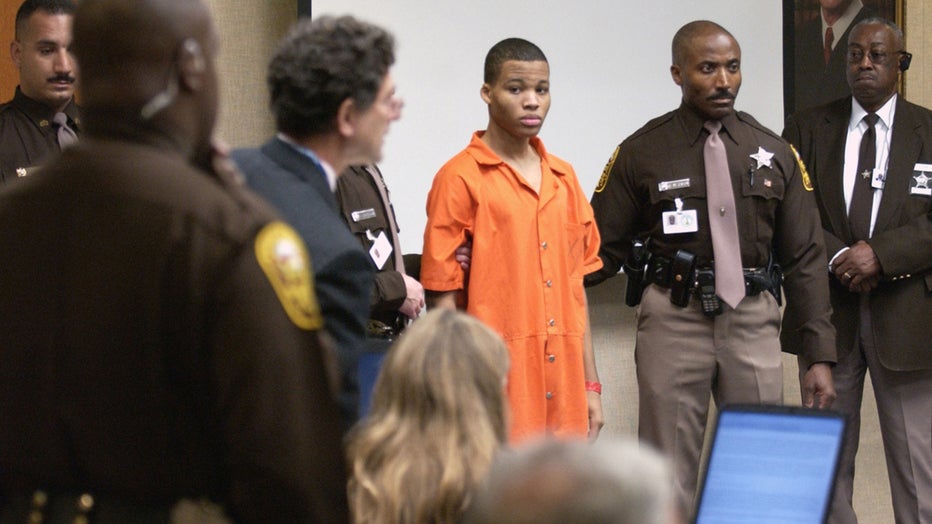Supreme Court seems split on possible resentencing for teen sniper Lee Boyd Malvo
WASHINGTON (AP) - Liberal and conservative justices seemed split Wednesday on whether to grant a new sentencing hearing to Lee Boyd Malvo, one of two snipers who terrorized the Washington D.C., region in 2002 when he was a teenager.
The Supreme Court heard arguments on whether Malvo, who was 17 at the time of the killings, was wrongly sentenced in Virginia to life without parole.
His attorneys say he deserves a new hearing because of recent Supreme Court rulings barring mandatory life sentences for juveniles and reserving the punishment for those "rare children whose crimes reflect irreparable corruption."
Virginia argues Malvo's life sentence was not mandatory because the judge theoretically had the discretion to suspend part of Malvo's life sentence, despite a state law mandating either execution or life without parole as the only sentencing options for a capital murder conviction.
DOWNLOAD: The FOX 5 DC News app for local breaking news and weather
Even if Malvo prevails at the high court and gets a new sentencing hearing, a Virginia judge could reimpose a life sentence. Malvo also faces six life-without-parole terms in Maryland that are not technically in front of the high court, though courts there have placed Malvo's Maryland appeals on hold while the Supreme Court decides this case.
Elena Kagan, a justice on the court's liberal wing, said the high court's previous rulings on the subject should be understood broadly, and that courts are bound to give serious consideration to the notion that "youth matters" in determining a juvenile's sentence.
On the other side, conservative Justice Samuel Alito suggested the court should simply apply the wording from its earlier case, which bans only mandatory life sentences without parole for juveniles. Because Virginia's Supreme Court has already ruled that Malvo's trial judge had the discretion to lower Malvo's sentence, he would not be entitled to any relief under the court's previous ruling.

Sniper suspect Lee Boyd Malvo is escorted by deputies into court to be identified by a witness during the murder trial at the Virginia Beach Circuit Court October 22, 2003 in Virginia Beach, Virginia. (Photo by Davis Turner-Pool/Getty Images)
Malvo was a 15-year-old from Jamaica who had been sent to live in Antigua when he met John Allen Muhammad and latched onto him as a father figure. Muhammad trained and indoctrinated Malvo, and in 2002 the pair embarked on a nationwide killing spree that concluded with a three-week rampage in Maryland, Virginia and the District of Columbia that left 10 people dead and three wounded.
The random shootings terrorized the region, and featured bizarre coded conversations from police to the snipers delivered during live news conferences with phrases like "Call me God" and "We have caught the sniper like a duck in a noose."
Notes left behind at the shooting scenes included demands for ransom, but trial testimony indicated the shootings were a plan for Muhammad to regain custody of his children by killing his ex-wife, who lived in the region, and making her death appear to be a result of random violence.
Muhammad was sentenced to death and executed. Malvo pleaded insanity but was convicted. The jury was then tasked with sentencing Malvo either to death or to life without parole. It opted for the latter.
Victims of the snipers are divided on the question. Some survivors and family members say they oppose a resentencing.
Cheryll Shaw, whose father Jerry Taylor was killed by the snipers in Arizona, is one of several surviving victims and family members who have endorsed resentencing.
Shaw, who attended Wednesday's arguments, said after the arguments that she hopes Malvo gets a new hearing and that he is transferred from Virginia's notorious Red Onion prison, but she is unsure whether she wants to see him released.
"I'm not ready to see him get out any time soon," she said.

